Effective Communication Strategies for Engineering Graduate Recruits
VerifiedAdded on 2022/11/10
|5
|1534
|466
Report
AI Summary
This report examines the crucial communication skills required for engineering graduate recruits. It emphasizes the importance of both technical and soft skills, including verbal and written communication, teamwork, and interpersonal abilities. The report highlights the need for engineers to handle various communication modes, create technical documents, and manage projects effectively. It also discusses the significance of technical proficiency, problem-solving, and a proactive attitude towards learning and career development. The report provides insights into what recruiters look for in candidates, including technical skills, interpersonal skills, and enthusiasm for continuous learning, which is essential for career advancement in the competitive engineering field. The report also references several studies and articles that support the findings and give credence to the conclusions.
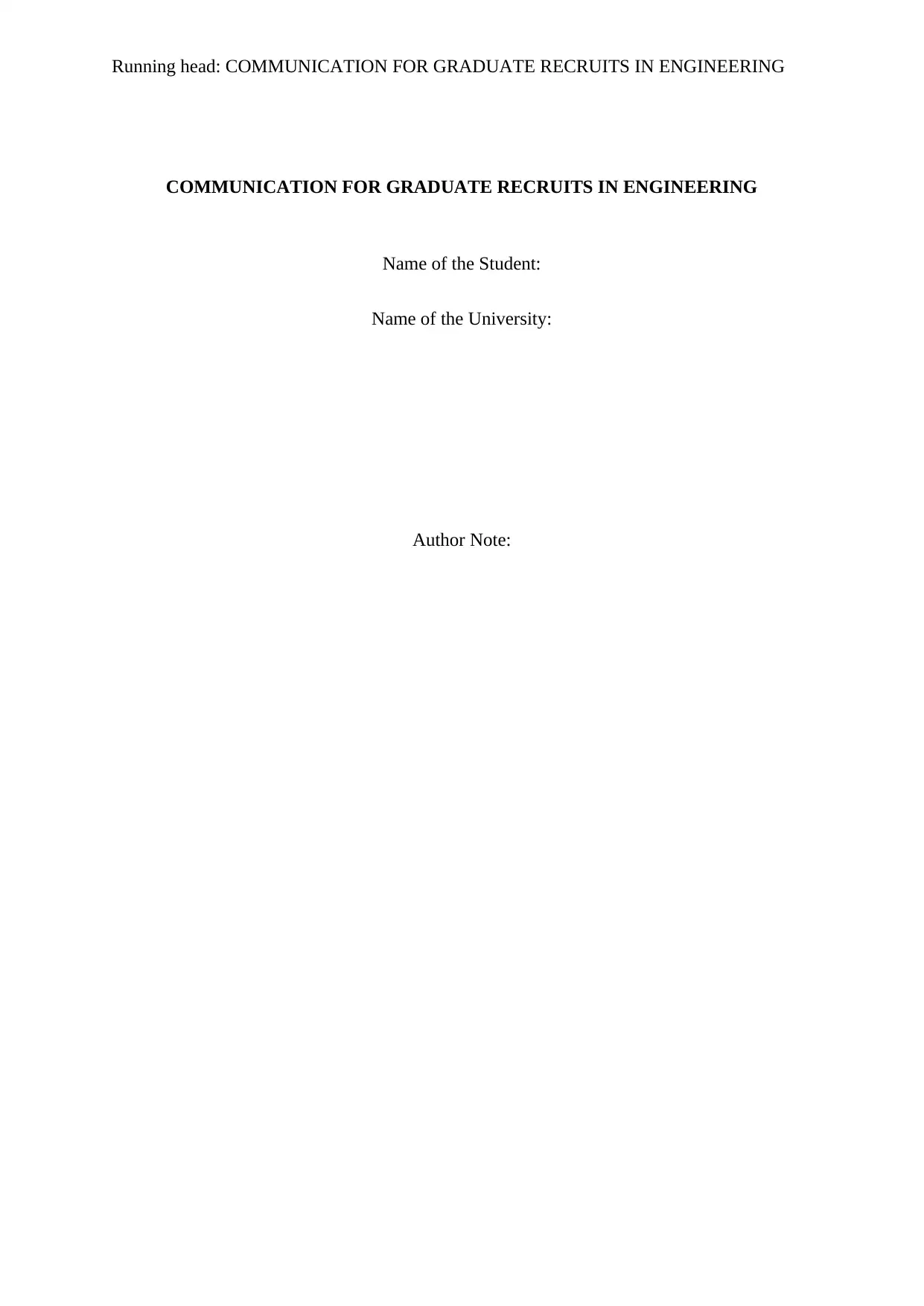
Running head: COMMUNICATION FOR GRADUATE RECRUITS IN ENGINEERING
COMMUNICATION FOR GRADUATE RECRUITS IN ENGINEERING
Name of the Student:
Name of the University:
Author Note:
COMMUNICATION FOR GRADUATE RECRUITS IN ENGINEERING
Name of the Student:
Name of the University:
Author Note:
Paraphrase This Document
Need a fresh take? Get an instant paraphrase of this document with our AI Paraphraser
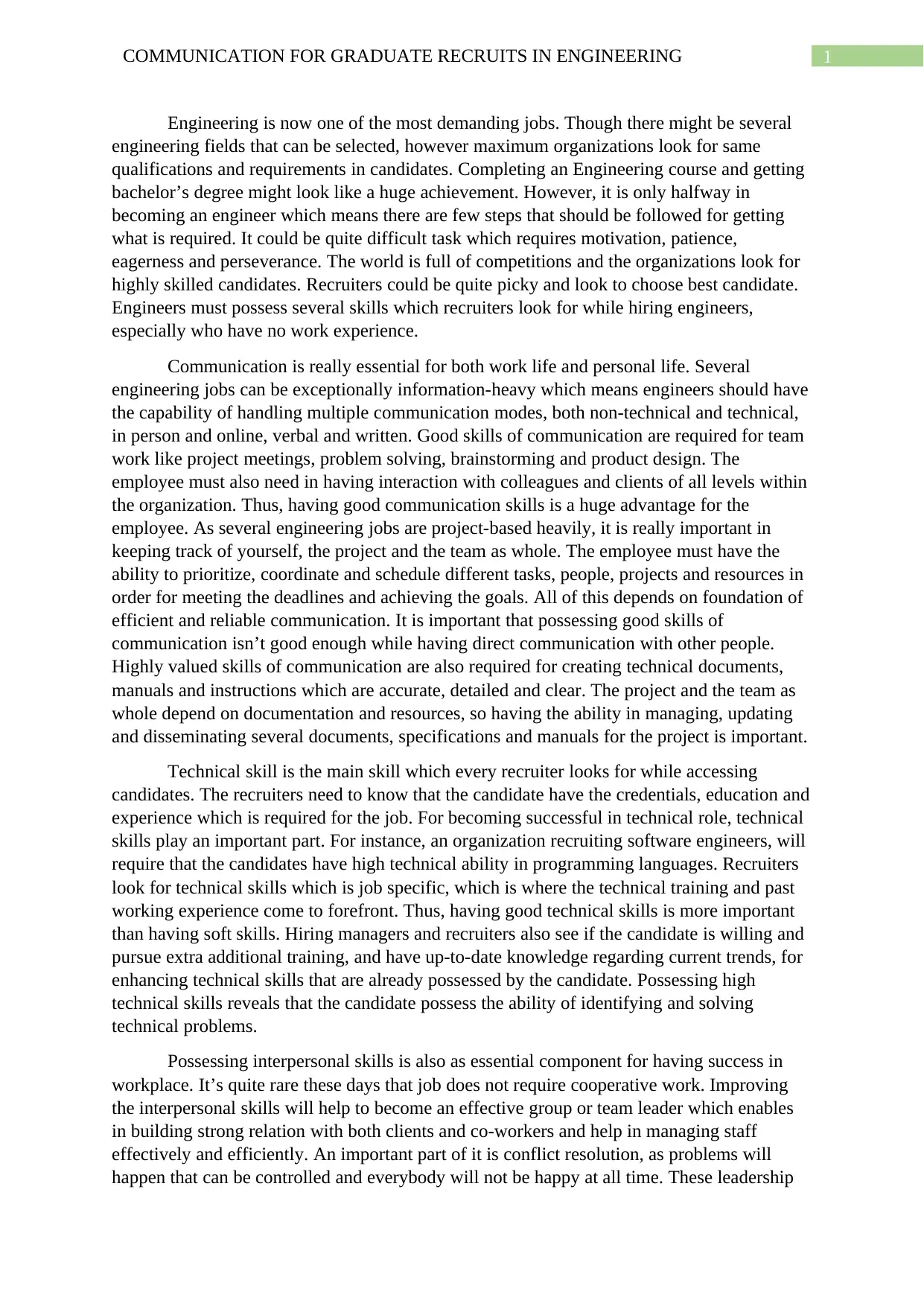
1COMMUNICATION FOR GRADUATE RECRUITS IN ENGINEERING
Engineering is now one of the most demanding jobs. Though there might be several
engineering fields that can be selected, however maximum organizations look for same
qualifications and requirements in candidates. Completing an Engineering course and getting
bachelor’s degree might look like a huge achievement. However, it is only halfway in
becoming an engineer which means there are few steps that should be followed for getting
what is required. It could be quite difficult task which requires motivation, patience,
eagerness and perseverance. The world is full of competitions and the organizations look for
highly skilled candidates. Recruiters could be quite picky and look to choose best candidate.
Engineers must possess several skills which recruiters look for while hiring engineers,
especially who have no work experience.
Communication is really essential for both work life and personal life. Several
engineering jobs can be exceptionally information-heavy which means engineers should have
the capability of handling multiple communication modes, both non-technical and technical,
in person and online, verbal and written. Good skills of communication are required for team
work like project meetings, problem solving, brainstorming and product design. The
employee must also need in having interaction with colleagues and clients of all levels within
the organization. Thus, having good communication skills is a huge advantage for the
employee. As several engineering jobs are project-based heavily, it is really important in
keeping track of yourself, the project and the team as whole. The employee must have the
ability to prioritize, coordinate and schedule different tasks, people, projects and resources in
order for meeting the deadlines and achieving the goals. All of this depends on foundation of
efficient and reliable communication. It is important that possessing good skills of
communication isn’t good enough while having direct communication with other people.
Highly valued skills of communication are also required for creating technical documents,
manuals and instructions which are accurate, detailed and clear. The project and the team as
whole depend on documentation and resources, so having the ability in managing, updating
and disseminating several documents, specifications and manuals for the project is important.
Technical skill is the main skill which every recruiter looks for while accessing
candidates. The recruiters need to know that the candidate have the credentials, education and
experience which is required for the job. For becoming successful in technical role, technical
skills play an important part. For instance, an organization recruiting software engineers, will
require that the candidates have high technical ability in programming languages. Recruiters
look for technical skills which is job specific, which is where the technical training and past
working experience come to forefront. Thus, having good technical skills is more important
than having soft skills. Hiring managers and recruiters also see if the candidate is willing and
pursue extra additional training, and have up-to-date knowledge regarding current trends, for
enhancing technical skills that are already possessed by the candidate. Possessing high
technical skills reveals that the candidate possess the ability of identifying and solving
technical problems.
Possessing interpersonal skills is also as essential component for having success in
workplace. It’s quite rare these days that job does not require cooperative work. Improving
the interpersonal skills will help to become an effective group or team leader which enables
in building strong relation with both clients and co-workers and help in managing staff
effectively and efficiently. An important part of it is conflict resolution, as problems will
happen that can be controlled and everybody will not be happy at all time. These leadership
Engineering is now one of the most demanding jobs. Though there might be several
engineering fields that can be selected, however maximum organizations look for same
qualifications and requirements in candidates. Completing an Engineering course and getting
bachelor’s degree might look like a huge achievement. However, it is only halfway in
becoming an engineer which means there are few steps that should be followed for getting
what is required. It could be quite difficult task which requires motivation, patience,
eagerness and perseverance. The world is full of competitions and the organizations look for
highly skilled candidates. Recruiters could be quite picky and look to choose best candidate.
Engineers must possess several skills which recruiters look for while hiring engineers,
especially who have no work experience.
Communication is really essential for both work life and personal life. Several
engineering jobs can be exceptionally information-heavy which means engineers should have
the capability of handling multiple communication modes, both non-technical and technical,
in person and online, verbal and written. Good skills of communication are required for team
work like project meetings, problem solving, brainstorming and product design. The
employee must also need in having interaction with colleagues and clients of all levels within
the organization. Thus, having good communication skills is a huge advantage for the
employee. As several engineering jobs are project-based heavily, it is really important in
keeping track of yourself, the project and the team as whole. The employee must have the
ability to prioritize, coordinate and schedule different tasks, people, projects and resources in
order for meeting the deadlines and achieving the goals. All of this depends on foundation of
efficient and reliable communication. It is important that possessing good skills of
communication isn’t good enough while having direct communication with other people.
Highly valued skills of communication are also required for creating technical documents,
manuals and instructions which are accurate, detailed and clear. The project and the team as
whole depend on documentation and resources, so having the ability in managing, updating
and disseminating several documents, specifications and manuals for the project is important.
Technical skill is the main skill which every recruiter looks for while accessing
candidates. The recruiters need to know that the candidate have the credentials, education and
experience which is required for the job. For becoming successful in technical role, technical
skills play an important part. For instance, an organization recruiting software engineers, will
require that the candidates have high technical ability in programming languages. Recruiters
look for technical skills which is job specific, which is where the technical training and past
working experience come to forefront. Thus, having good technical skills is more important
than having soft skills. Hiring managers and recruiters also see if the candidate is willing and
pursue extra additional training, and have up-to-date knowledge regarding current trends, for
enhancing technical skills that are already possessed by the candidate. Possessing high
technical skills reveals that the candidate possess the ability of identifying and solving
technical problems.
Possessing interpersonal skills is also as essential component for having success in
workplace. It’s quite rare these days that job does not require cooperative work. Improving
the interpersonal skills will help to become an effective group or team leader which enables
in building strong relation with both clients and co-workers and help in managing staff
effectively and efficiently. An important part of it is conflict resolution, as problems will
happen that can be controlled and everybody will not be happy at all time. These leadership
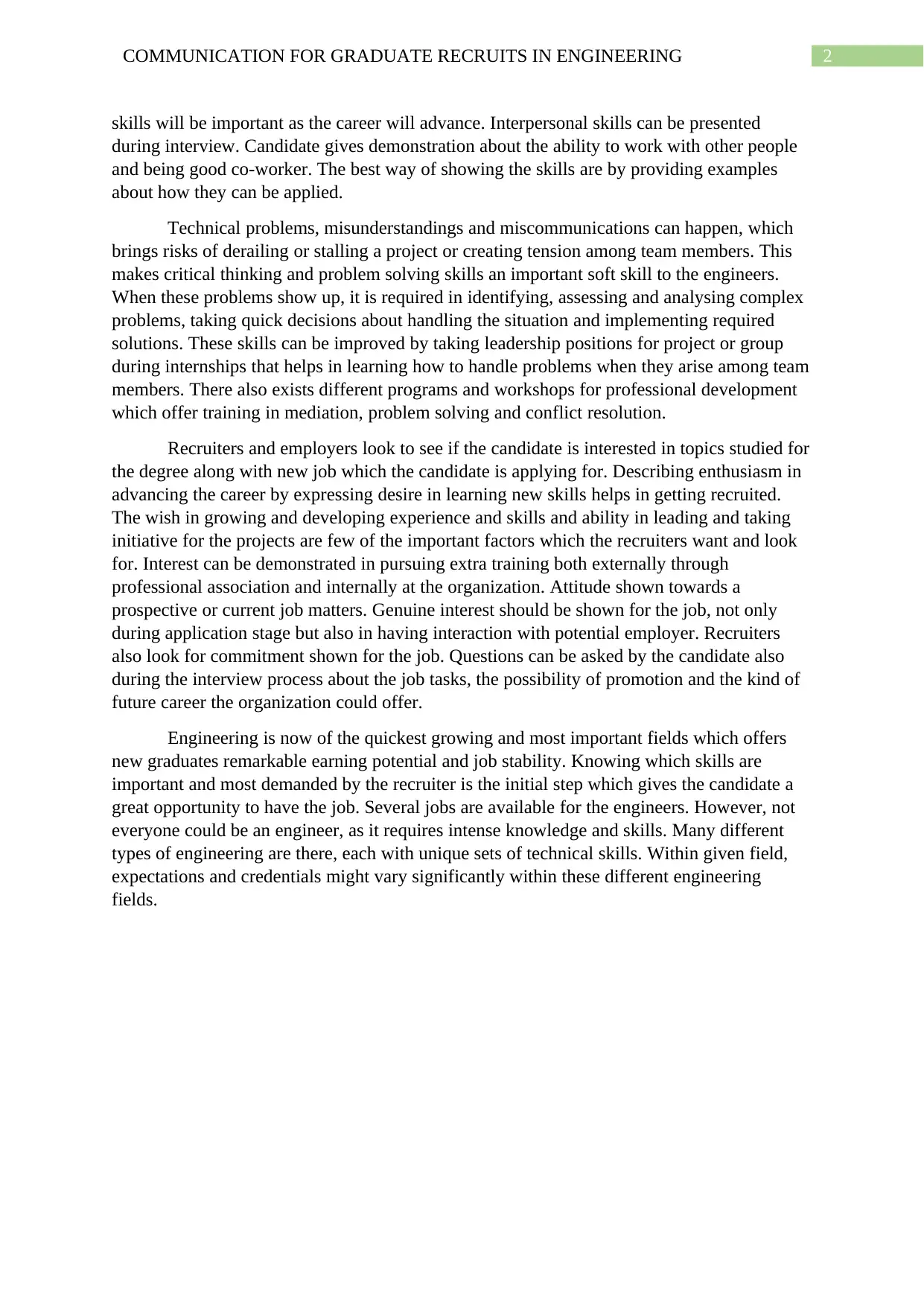
2COMMUNICATION FOR GRADUATE RECRUITS IN ENGINEERING
skills will be important as the career will advance. Interpersonal skills can be presented
during interview. Candidate gives demonstration about the ability to work with other people
and being good co-worker. The best way of showing the skills are by providing examples
about how they can be applied.
Technical problems, misunderstandings and miscommunications can happen, which
brings risks of derailing or stalling a project or creating tension among team members. This
makes critical thinking and problem solving skills an important soft skill to the engineers.
When these problems show up, it is required in identifying, assessing and analysing complex
problems, taking quick decisions about handling the situation and implementing required
solutions. These skills can be improved by taking leadership positions for project or group
during internships that helps in learning how to handle problems when they arise among team
members. There also exists different programs and workshops for professional development
which offer training in mediation, problem solving and conflict resolution.
Recruiters and employers look to see if the candidate is interested in topics studied for
the degree along with new job which the candidate is applying for. Describing enthusiasm in
advancing the career by expressing desire in learning new skills helps in getting recruited.
The wish in growing and developing experience and skills and ability in leading and taking
initiative for the projects are few of the important factors which the recruiters want and look
for. Interest can be demonstrated in pursuing extra training both externally through
professional association and internally at the organization. Attitude shown towards a
prospective or current job matters. Genuine interest should be shown for the job, not only
during application stage but also in having interaction with potential employer. Recruiters
also look for commitment shown for the job. Questions can be asked by the candidate also
during the interview process about the job tasks, the possibility of promotion and the kind of
future career the organization could offer.
Engineering is now of the quickest growing and most important fields which offers
new graduates remarkable earning potential and job stability. Knowing which skills are
important and most demanded by the recruiter is the initial step which gives the candidate a
great opportunity to have the job. Several jobs are available for the engineers. However, not
everyone could be an engineer, as it requires intense knowledge and skills. Many different
types of engineering are there, each with unique sets of technical skills. Within given field,
expectations and credentials might vary significantly within these different engineering
fields.
skills will be important as the career will advance. Interpersonal skills can be presented
during interview. Candidate gives demonstration about the ability to work with other people
and being good co-worker. The best way of showing the skills are by providing examples
about how they can be applied.
Technical problems, misunderstandings and miscommunications can happen, which
brings risks of derailing or stalling a project or creating tension among team members. This
makes critical thinking and problem solving skills an important soft skill to the engineers.
When these problems show up, it is required in identifying, assessing and analysing complex
problems, taking quick decisions about handling the situation and implementing required
solutions. These skills can be improved by taking leadership positions for project or group
during internships that helps in learning how to handle problems when they arise among team
members. There also exists different programs and workshops for professional development
which offer training in mediation, problem solving and conflict resolution.
Recruiters and employers look to see if the candidate is interested in topics studied for
the degree along with new job which the candidate is applying for. Describing enthusiasm in
advancing the career by expressing desire in learning new skills helps in getting recruited.
The wish in growing and developing experience and skills and ability in leading and taking
initiative for the projects are few of the important factors which the recruiters want and look
for. Interest can be demonstrated in pursuing extra training both externally through
professional association and internally at the organization. Attitude shown towards a
prospective or current job matters. Genuine interest should be shown for the job, not only
during application stage but also in having interaction with potential employer. Recruiters
also look for commitment shown for the job. Questions can be asked by the candidate also
during the interview process about the job tasks, the possibility of promotion and the kind of
future career the organization could offer.
Engineering is now of the quickest growing and most important fields which offers
new graduates remarkable earning potential and job stability. Knowing which skills are
important and most demanded by the recruiter is the initial step which gives the candidate a
great opportunity to have the job. Several jobs are available for the engineers. However, not
everyone could be an engineer, as it requires intense knowledge and skills. Many different
types of engineering are there, each with unique sets of technical skills. Within given field,
expectations and credentials might vary significantly within these different engineering
fields.
⊘ This is a preview!⊘
Do you want full access?
Subscribe today to unlock all pages.

Trusted by 1+ million students worldwide
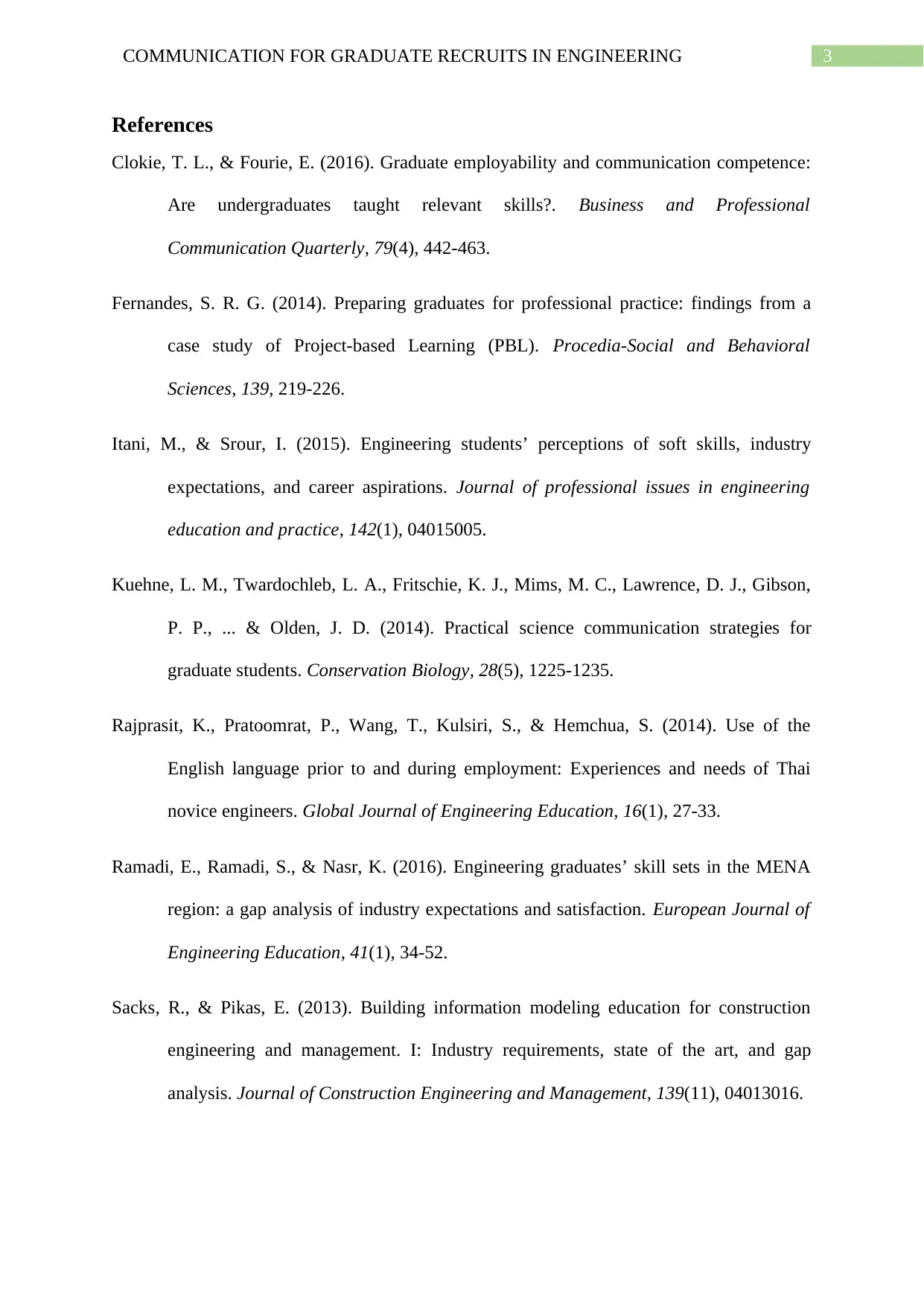
3COMMUNICATION FOR GRADUATE RECRUITS IN ENGINEERING
References
Clokie, T. L., & Fourie, E. (2016). Graduate employability and communication competence:
Are undergraduates taught relevant skills?. Business and Professional
Communication Quarterly, 79(4), 442-463.
Fernandes, S. R. G. (2014). Preparing graduates for professional practice: findings from a
case study of Project-based Learning (PBL). Procedia-Social and Behavioral
Sciences, 139, 219-226.
Itani, M., & Srour, I. (2015). Engineering students’ perceptions of soft skills, industry
expectations, and career aspirations. Journal of professional issues in engineering
education and practice, 142(1), 04015005.
Kuehne, L. M., Twardochleb, L. A., Fritschie, K. J., Mims, M. C., Lawrence, D. J., Gibson,
P. P., ... & Olden, J. D. (2014). Practical science communication strategies for
graduate students. Conservation Biology, 28(5), 1225-1235.
Rajprasit, K., Pratoomrat, P., Wang, T., Kulsiri, S., & Hemchua, S. (2014). Use of the
English language prior to and during employment: Experiences and needs of Thai
novice engineers. Global Journal of Engineering Education, 16(1), 27-33.
Ramadi, E., Ramadi, S., & Nasr, K. (2016). Engineering graduates’ skill sets in the MENA
region: a gap analysis of industry expectations and satisfaction. European Journal of
Engineering Education, 41(1), 34-52.
Sacks, R., & Pikas, E. (2013). Building information modeling education for construction
engineering and management. I: Industry requirements, state of the art, and gap
analysis. Journal of Construction Engineering and Management, 139(11), 04013016.
References
Clokie, T. L., & Fourie, E. (2016). Graduate employability and communication competence:
Are undergraduates taught relevant skills?. Business and Professional
Communication Quarterly, 79(4), 442-463.
Fernandes, S. R. G. (2014). Preparing graduates for professional practice: findings from a
case study of Project-based Learning (PBL). Procedia-Social and Behavioral
Sciences, 139, 219-226.
Itani, M., & Srour, I. (2015). Engineering students’ perceptions of soft skills, industry
expectations, and career aspirations. Journal of professional issues in engineering
education and practice, 142(1), 04015005.
Kuehne, L. M., Twardochleb, L. A., Fritschie, K. J., Mims, M. C., Lawrence, D. J., Gibson,
P. P., ... & Olden, J. D. (2014). Practical science communication strategies for
graduate students. Conservation Biology, 28(5), 1225-1235.
Rajprasit, K., Pratoomrat, P., Wang, T., Kulsiri, S., & Hemchua, S. (2014). Use of the
English language prior to and during employment: Experiences and needs of Thai
novice engineers. Global Journal of Engineering Education, 16(1), 27-33.
Ramadi, E., Ramadi, S., & Nasr, K. (2016). Engineering graduates’ skill sets in the MENA
region: a gap analysis of industry expectations and satisfaction. European Journal of
Engineering Education, 41(1), 34-52.
Sacks, R., & Pikas, E. (2013). Building information modeling education for construction
engineering and management. I: Industry requirements, state of the art, and gap
analysis. Journal of Construction Engineering and Management, 139(11), 04013016.
Paraphrase This Document
Need a fresh take? Get an instant paraphrase of this document with our AI Paraphraser
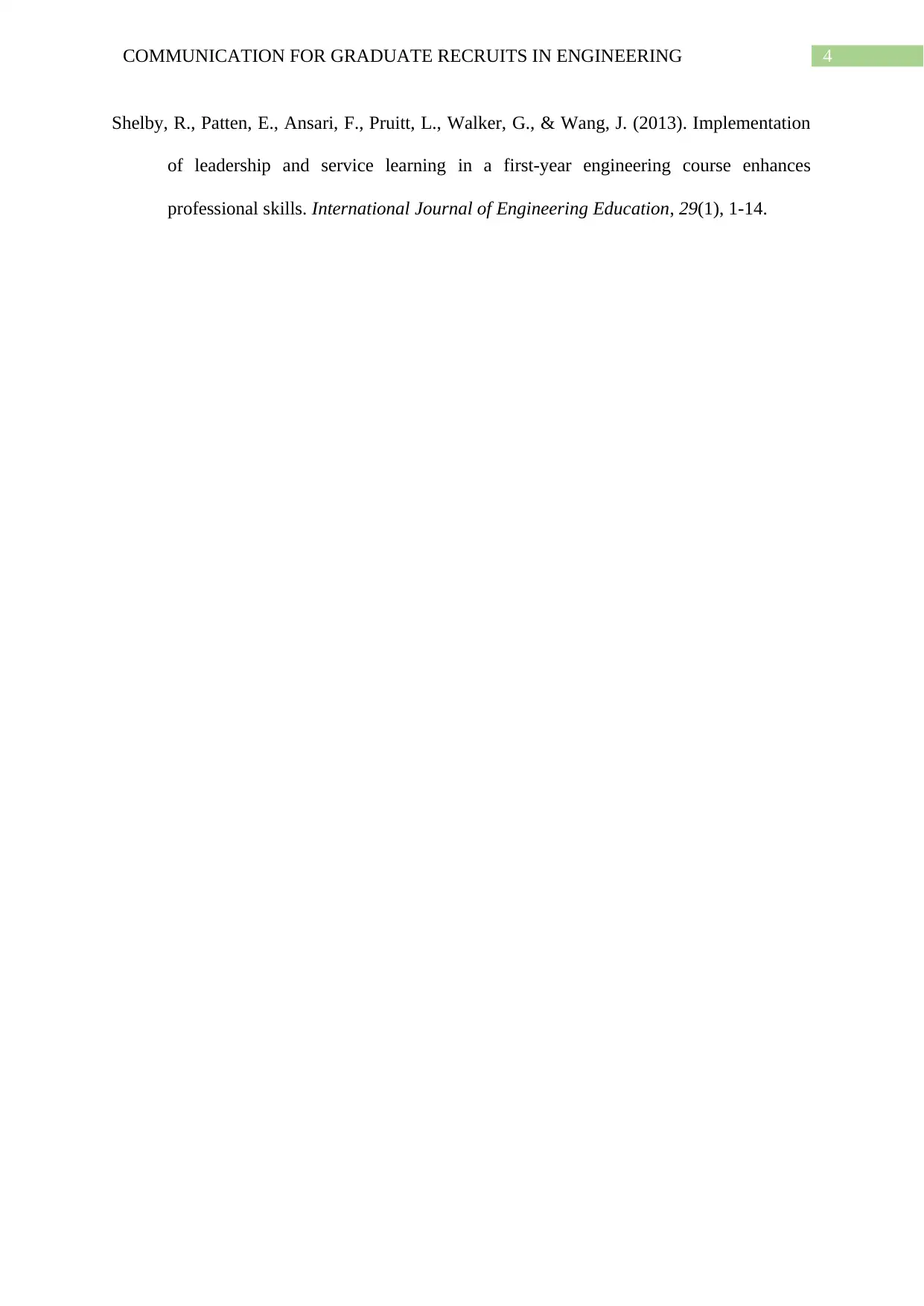
4COMMUNICATION FOR GRADUATE RECRUITS IN ENGINEERING
Shelby, R., Patten, E., Ansari, F., Pruitt, L., Walker, G., & Wang, J. (2013). Implementation
of leadership and service learning in a first-year engineering course enhances
professional skills. International Journal of Engineering Education, 29(1), 1-14.
Shelby, R., Patten, E., Ansari, F., Pruitt, L., Walker, G., & Wang, J. (2013). Implementation
of leadership and service learning in a first-year engineering course enhances
professional skills. International Journal of Engineering Education, 29(1), 1-14.
1 out of 5
Related Documents
Your All-in-One AI-Powered Toolkit for Academic Success.
+13062052269
info@desklib.com
Available 24*7 on WhatsApp / Email
![[object Object]](/_next/static/media/star-bottom.7253800d.svg)
Unlock your academic potential
Copyright © 2020–2026 A2Z Services. All Rights Reserved. Developed and managed by ZUCOL.




